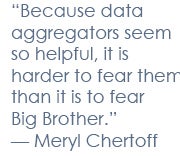
It has occurred to us, here at the Aspen Institute Justice and Society Program, that the real threat to privacy we most need to worry about does not come from the National Security Agency and other government spying agencies, but from data aggregation by companies like Google and Facebook. The government agencies are constrained by legal rules, judicial review, and Congressional oversight (even if the briefings are classified, they are occurring). But for the average consumer, everything you do online — shop, read the news, and interact through social media — feeds a vast industry that aggregates data, allowing data vendors to create a granular picture of what makes you, you. Add to this data collected from the so-called “Internet of Things”— wired devices like a thermostat that knows when you will be at home and away, or a pill bottle that knows when it is time to refill your prescription — and surveillance uploaded to the Cloud through Google Glass, and soon, pretty much everything about your identity will be available for sale by commercial database vendors. A recent series of news stories seem to validate these concerns further.
 A timely and topical Washington Post article asks if your online newspaper now “reads you” as you read it. Psychologist Richard Epstein suggests that a Search Engine Manipulation Effect (SEME) could have influenced the outcome of the recent Indian election, and could be coming soon to an election near you.
A timely and topical Washington Post article asks if your online newspaper now “reads you” as you read it. Psychologist Richard Epstein suggests that a Search Engine Manipulation Effect (SEME) could have influenced the outcome of the recent Indian election, and could be coming soon to an election near you.
But a recent Politico article by Josh Gerstein and Stephanie Simon offers an even more comprehensive and insightful treatment. The writers describe the many ways that data miners are snooping on you, and some of the reasons that Congress and the executive regulatory agencies have been lax in monitoring their online surveillance. Gerstein and Simon analyze government leniency both by Republicans and by Democrats. The recent White House report by John Podesta presents a deeper dive, with an analysis of the state of legislative and case law on this topic.
I’d like to add my own non-scientific observation. One of the reasons the NSA-Snowden affair has resonated so much with the public, both here in the US and globally, is because there is a growing discomfort with this loss of privacy. But because data aggregators seem so helpful — offering us reading recommendations, suggesting what we’d like to buy on sale (heck, they even know my shoe size!) — it is harder to fear them than it is to fear Big Brother.
The government is so — well, parental. But your favorite shopping site just sits and gathers more and more information about you with each click. And unlike the government, for whom almost all the data is mere white noise, the aggregators, essentially unconstrained by regulation, are interested in simply drawing connections and turning them into economic gain or — if Epstein is right about SEME — more nefarious uses.
This brings me to something that my boss, Aspen Institute President and CEO Walter Isaacson, said last week at the 43rd Annual Jefferson Lecture sponsored by the National Endowment for the Humanities. Isaacson counseled his humanities-oriented audience on how essential it is for them to understand scientists, just as scientists need to understand the importance of literature, art, and culture. And while in his view the threat of the “singularity”— the point at which computers would attain agency — still remains unlikely, Isaacson thinks the partnership of man and computer has enormously powerful potential. Constitutionally an optimist, he sees this as cause for hope. But as recent developments in the data aggregation business show, stricter regulation of the way we harness the capacity of the Internet would not hurt one bit.
Meryl Justin Chertoff is executive director of the Aspen Institute Justice and Society Program.

